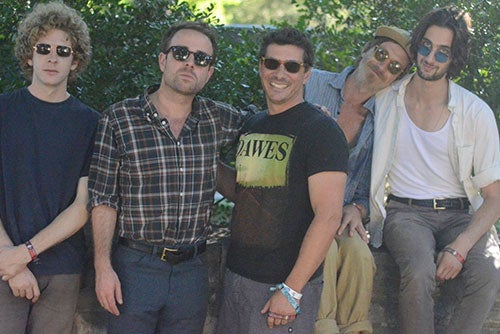
By M. Yvonne Taylor
And how can music be used to help counselors in training? According to Educational Psychology Professor Aaron Rochlen, more than you might think.
In his Counseling Theories class, Rochlen frequently connects complex psychological theories to media, movie clips, and song lyrics. In a recent visit to his graduate-level course, several examples unfolded. He played a clip of LeBron James discussing why people enjoy when he loses as examples of “splitting” and “projection.” A clip from the classic movie Scarface, where Tony Montana tells others why they needed him to see him as the “bad guy” illustrated the concept of projective identification.
In another lesson, Rochlen shared a clip of the new Jim Carrey series Kidding, in which Carrey plays Mr. Pickles, a happy-go-lucky TV character whose personality contrasts his depressed, grief-ridden, off-screen character. The scene was used to show the Jungian concepts of persona, shadow, and incongruence.
The class also talked about Tiger Woods, who made a recent comeback after a devastating personal scandal to win his first major tour in five years. Woods’ rise, fall, and return provide a case study for competing archetypes. Specifically, the class discussed the destructive power of what one could argue as Woods’ “hidden shadow,” which competes with his earlier good-guy public persona.
These in-class discussions gave the students the opportunity to apply what they learn about psychological theory and counseling. Says Rochlen, “Popular culture connects to and entertains us. But it’s often much deeper, more personal. In class, I try to make these connections and use these examples to facilitate an understanding of human distress and common life-challenges in a fun way.
It’s within this context that Rochlen introduced lyrics of one of his favorite bands, Dawes. Says Rochlen, “When I first discovered Dawes, I loved the music. After a while, I realized the lyrics offered ideal connections to concepts articulated by Freud, Jung, and existential authors. In class, it became clear that my students were learning in different, creative, personal ways, and who doesn’t like jamming out in class?”
Some Dawes examples used for teaching stand out. He played “Just Beneath the Surface” to illustrate Freud’s concepts of the unconscious, defense mechanisms, and Freudian slips. He asked students to listen to “Something in Common” while prompting them to reflect on the concept of “persona” and the unconscious message of dreams.
After the listen, Rochlen typically asks students to describe what they’ve heard, including their emotional responses, with a particular connection to the lyrics. One student said that the Dawes line “All the best-kept secrets are the ones I didn’t know I had” had a connection to the unconscious. Explained Nina Clinton, a student studying counseling education, “Freud saw the unconscious as having all of the deeply hidden secrets or true selves hidden away, that in therapy he tried to recover.”

The lines, “The way that she remembers me is not the way I really am. But I’m hoping they’ve got something in common” reminded another student of “working with the shadow.” They explained, “The persona and shadow should share some of the same qualities so that a person does not become too conflicted … which leads to anxiety.” When a person’s outward persona and shadow have nothing in common, there can be hell to pay.
Taylor Goldsmith, the lead singer and songwriter for the band, learned that Rochlen was using the band’s lyrics for class. He said that it was “easily the highest honor of my career as a songwriter. It goes way beyond what dreams a songwriter like me could possibly have for his or her songs. When I met Aaron, he explained to me the ideas he used my songs to help illustrate. I wasn’t familiar with any of the terms or thinkers he was referring to, so that was definitely an added thrill … especially for someone who never got to finish college, which is something I hope I get to go back and do someday.”
Says Rochlen, “A songwriter doesn’t need to be aware of the concepts to be impacted by them or communicate them. It was clear Taylor has done plenty of introspection in his own life.”
Rochlen adds, “That’s part of why using popular culture is so powerful. It shows these concepts are an intrinsic part of the human mind and psyche. Each of us has the capacity to demonstrate the core concepts in our life, in healthy or unhealthy ways. Of course, although Freud, Jung and others wrote about all of this in different times, the prescience of their work remains … just turn on the radio or television.”

